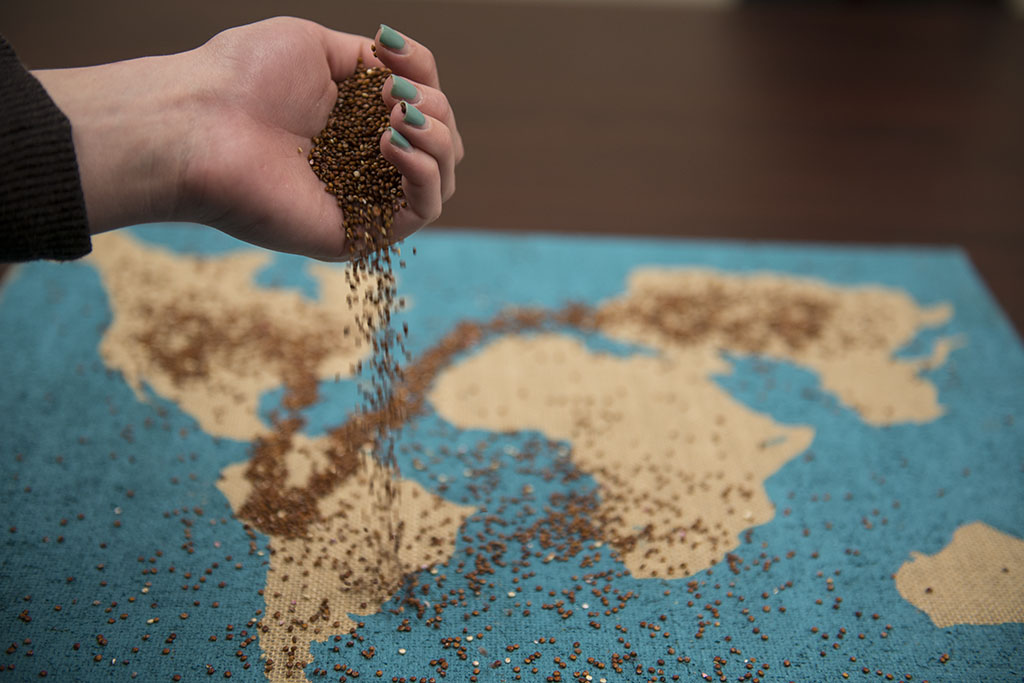As convenience increases, so does estrangement.
We’ve learned how to microwave frozen gourmet meals but have forgotten how to boil pasta. Strawberries magically appear in the dead of winter, and we indulge without wondering from whence they came. We grab a brightly packaged box of food without a thought to the ingredients or how it was made.
TRACING FOOD TO ITS ORIGINS
Think back to the last food you ate and see if you can trace its origins any further than the place you bought the ingredients or prepared meal. Chances are you can’t.
Yet each decision we make about food impacts numerous people, whom convenience has allowed us to ignore. Cookies come from cartoon elves instead of a neighborhood baker. We purchase our eggs without ever having to see a chicken or its farmer. We forget that real people in real places grow the piles of produce we are fortunate enough to peruse at the supermarket.
The food system has always been a series of connected steps, yet over the last several decades the process has grown longer and more complex, and it reaches further than many can or care to comprehend. However, as humans who claim to care about the welfare of people on a global scale, we must either pay attention or be content to dine on hypocrisy.
The United States imported nearly $32 billion worth of agricultural products in 2013, according to data from the U.S. Department of Commerce’s International Trade Administration. If you bought any fruits, vegetables or grains that were not grown in this country, the money you spent is a part, however small, of those billions of dollars.
By buying strawberries from Mexico, rice from Asia or quinoa from South America, you are taking part in the global food chain, sending your dollars through the store who bought from a supplier, who may have another supplier, who paid the farmer who grew your food.
The United States imports about 17 percent of its food supply as of 2009, according to the United States Department of Agriculture’s Economic Research Service. The number is part of a rising trend in the last three decades, due to many factors, including demand for produce during off-seasons and foreign goods available at a cheaper price than domestic goods.
In the global economy of imports and exports, you have the power to support a farmer thousands of miles away in a country that may never cross your mind as more than a vague location indicated on a label by simply putting something in your cart.
FOOD FOR THOUGHT
Quinoa, a protein-packed seed that has been lauded as a superfood, provided a lesson in considering the ramifications of our food choices.
A media flurry followed the fad food to its Bolivian roots and found two sides to the celebrated seed. Though the price of quinoa has tripled since 2006, providing prosperity to small farmers in an impoverished country, environmental questions and land disputes arose as the market rocked from quinoa’s international demand, according to a Time article published in April 2012.
A similar New York Times article from March 2011 pointed out that Bolivian consumption of quinoa had significantly decreased as international demand rose. However other outlets, such as the Guardian, leaped ahead and suggested refraining from buying quinoa, disregarding quotes from locals about the younger generation’s unrelated rejection of traditional quinoa in favor of processed foods as a large part of the drop in native consumption.
Suddenly, a moral dilemma appeared in front of health food shoppers who weren’t sure if they should feel guilty or hungry when staring down a bag of quinoa.
While this type of critical consideration about the origin of our food is important and necessary, we must also be careful not to jump to oversimplified conclusions due to sensationalization. Just as buying has consequences, so does the choice to boycott or abstain. In the case of quinoa, taking away the Bolivian farmer’s newfound prosperity is likely to cause more harm than good.
However, actively seeking out fair trade brands to ensure the farmer who grew your beloved quinoa received a fair price for his crop would be one simple way to ensure your dollar is contributing in a positive manner.
As responsible consumers, we must understand that our decisions to buy or not to buy have the possibility to affect a person’s livelihood. Since we do not live in a perfect world, every situation has challenges as well as benefits. The best we can do is weigh the facts and make informed choices, which requires effort but is part of our duty as members of the global food chain. Whatever you do, don’t become a stranger to your food.










